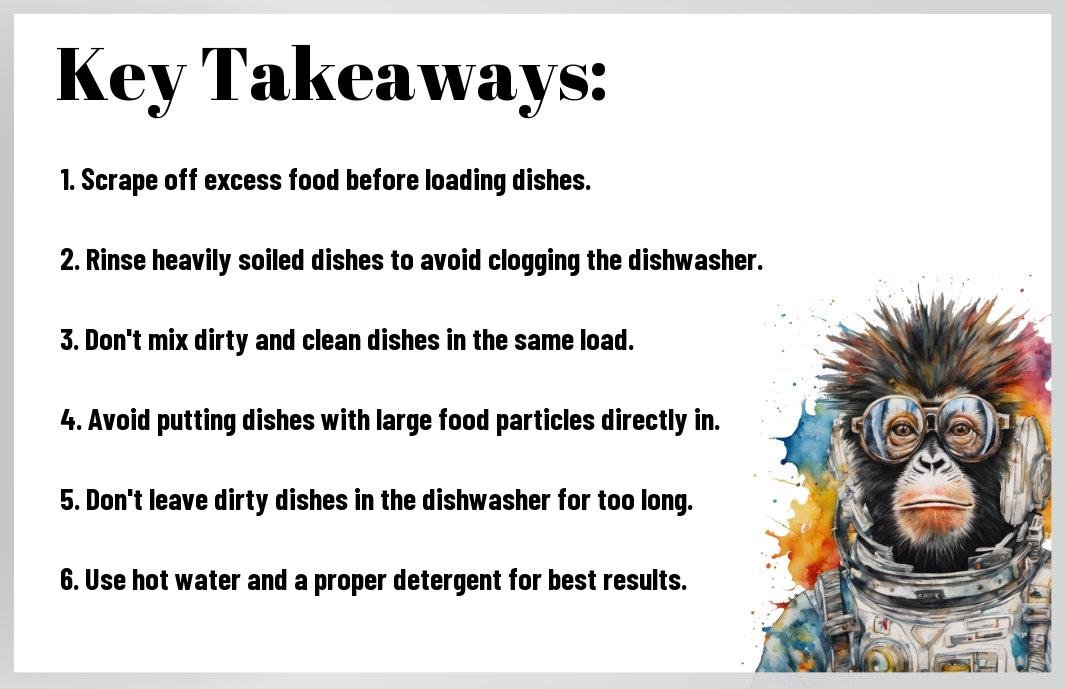Dealing with dirty dishes can be a never-ending chore, but the question remains: is it safe to put those crusty, sauce-stained plates and greasy pots directly into the dishwasher? The short answer is yes – but with caution. While the convenience of throwing everything into the dishwasher may seem like a time-saving solution, it’s important to note that some items may require pre-rinsing to ensure a thorough clean. Additionally, greasy dishes can cause build-up in the dishwasher and potentially clog the drain. On the other hand, putting soiled dishes in the dishwasher can be a more hygienic option compared to hand washing, as the hot water and detergent can effectively kill harmful bacteria. So, before you start tossing everything in, consider the potential risks and benefits of the process.
Key Takeaways:
- It is generally okay: Most dishwashers are designed to handle dirty dishes and remove food debris effectively.
- Rinse off excess food: Pre-rinsing dishes can help prevent clogging and ensure a thorough clean.
- Avoid large chunks: Large pieces of food should be scraped off dishes before putting them in the dishwasher to prevent blockages.
- Beware of certain items: Delicate or non-dishwasher safe items should be hand-washed to prevent damage.
- Regular maintenance: Cleaning the dishwasher and its filter regularly can help prevent buildup and maintain its effectiveness.
- Be mindful of detergent: Using too much or too little detergent can affect the dishwashing process, follow the manufacturer’s instructions.
- Consider environmental impact: While dishwashers can save water compared to hand washing, using them with only a few items increases energy consumption.

Understanding Dishwashers
While many people use dishwashers on a regular basis, not everyone fully understands how they work or the different types available. By gaining a better understanding of dishwashers, you can make more informed decisions about the best way to use them and ensure that your dishes are being cleaned effectively.
How Dishwashers Work
Dishwashers work by spraying a mixture of hot water and detergent onto dirty dishes and then draining the dirty water out. They also use a heating element to dry the dishes. Some dishwashers even have a pre-wash function to help remove tough stains before the main wash cycle.
Types of Dishwashers
There are several types of dishwashers available, including built-in, portable, and drawer dishwashers. Built-in dishwashers are the most common and are typically located under the counter in the kitchen. Portable dishwashers are on wheels and can be moved around as needed. Drawer dishwashers are smaller and can be installed at counter level for easy access. Assume that built-in dishwashers are the most popular choice for kitchens, but portable and drawer dishwashers may be a better option for small spaces or rental properties.
| Built-In Dishwashers | This type of dishwasher is permanently installed under the counter in your kitchen. |
| Portable Dishwashers | These dishwashers are on wheels and can be moved around as needed. |
| Drawer Dishwashers | These smaller dishwashers can be installed at counter level for easy access. |
| Advantages | – Convenient for small spaces or rental properties – Easy to install and move as needed |
| Considerations | – May not have the same capacity as built-in dishwashers – Limited features compared to built-in models |
Understanding the different types and their advantages and considerations can help you make the best choice for your specific needs.
Dish Preparation for Dishwashing
Not all dishes are created equal when it comes to preparing them for the dishwasher. Proper dish preparation is essential for achieving optimal results and maintaining the longevity of your dishwasher.
Pre-Rinsing Debate
There is a long-standing debate about whether pre-rinsing your dishes before loading them into the dishwasher is necessary. Some argue that pre-rinsing is a waste of water and time, as modern dishwashers are equipped to handle food residue. However, others believe that pre-rinsing is essential to prevent clogs and ensure a cleaner wash.
Impact of Food Residue on Dishwashers
Leaving food residue on your dishes can have a significant impact on your dishwasher. Not only can it lead to clogs in the dishwasher’s drainage system, but it can also cause odors and bacterial growth. Additionally, food residue can result in poor wash performance and ultimately affect the lifespan of your appliance.
Best Practices for Dishwasher Use
Now that you know it is okay to put dirty dishes in the dishwasher, it is essential to understand the best practices for using your dishwasher effectively. Following these best practices will ensure that your dishes come out clean and your dishwasher operates efficiently.
Proper Loading Techniques
When loading your dishwasher, be sure to properly space your dishes to allow for adequate water flow and optimal cleaning. Place larger items such as pots and pans on the bottom rack, while placing dishes, glasses, and smaller items on the upper rack. Be mindful of not blocking the sprayer arms as this can hinder the cleaning process. Additionally, ensure that all items are securely positioned to prevent them from shifting during the washing cycle.
Dishwasher Detergents and Additives
Choosing the right dishwasher detergent and additives is crucial to achieving clean and spotless dishes. Use a high-quality detergent that is specifically formulated for dishwashers to effectively break down and remove food residue. Additionally, consider using rinse aids to prevent spots and film on your glassware and dishes. It is important to follow the manufacturer’s guidelines for the amount of detergent and additives to use, as using too much can leave behind a residue and using too little can result in ineffective cleaning.
Maintenance and Dishwasher Care
For the smooth and efficient running of your dishwasher, it’s important to regularly clean and maintain it. This will not only ensure that your dishes come out sparkling clean each time, but it will also prolong the life of your appliance. In this section, we’ll cover the regular cleaning and servicing you should undertake, as well as troubleshooting common issues that may arise.
Regular Cleaning and Servicing
Regularly cleaning and servicing your dishwasher is essential to keep it in top working condition. You should clean the filter and inspect the spray arms for clogs or damage. You’ll also want to wipe down the door gasket and the interior of the dishwasher to prevent the buildup of food particles and residue that can lead to odors and inefficiencies. Additionally, running a cleaning cycle with a dishwasher cleaner product every few months can help to remove any hidden grease and gunk that may have accumulated. Over time, mineral deposits can also build up, so you may need to descale your dishwasher to keep it running smoothly. Regular servicing by a professional technician is also recommended to address any internal issues and to ensure that the dishwasher is functioning optimally.
Troubleshooting Common Issues
If you notice your dishwasher is not functioning as usual, there are some common issues you can troubleshoot. The most common issues include a clogged spray arm, a faulty door latch, a malfunctioning float switch, or a worn-out water inlet valve. If you encounter any of these problems, it’s important to address them promptly to avoid potential damage to your dishwasher or potential safety hazards. Always refer to the manufacturer’s manual for troubleshooting steps, and if the issue persists, it’s best to seek professional help to avoid further complications.
Regular cleaning and servicing of your dishwasher is crucial to maintain its efficiency and increase its lifespan. Troubleshooting common issues promptly can prevent potential damage and safety hazards.
Conclusion
With this in mind, it is generally acceptable to put dirty dishes in the dishwasher as long as you properly scrape off excess food and rinse them before loading. However, it is important to be mindful of certain items that are not dishwasher-safe and should be hand washed instead. By following these guidelines, you can ensure that your dishwasher effectively cleans your dishes and maintains its longevity. Remember to also regularly clean and maintain your dishwasher to avoid any build-up or malfunctions that could impact its performance.
FAQ
Q: Is it OK to put dirty dishes in the dishwasher?
A: Yes, it is fine to put dirty dishes in the dishwasher. However, it is best to scrape off large food particles before loading them.
Q: Do I need to rinse dishes before putting them in the dishwasher?
A: It is not necessary to fully rinse dishes before putting them in the dishwasher, but it is recommended to scrape off any large food particles to prevent clogging the dishwasher’s drain.
Q: Can I put pots and pans in the dishwasher?
A: Most pots and pans are dishwasher safe, but it is important to check the manufacturer’s instructions. Non-stick pans and cast iron cookware should be hand washed to preserve their finish.
Q: Should I use regular dish soap in the dishwasher?
A: No, regular dish soap should never be used in a dishwasher. Only use detergent specifically designed for dishwashers to avoid excessive suds and potential damage to the machine.
Q: Can I put plastic items in the dishwasher?
A: Many plastic items are dishwasher safe, but always check the packaging or item for dishwasher safety. Some plastics can warp or melt in high heat, so it is important to use the appropriate settings for plastic items.
Q: Is it safe to put delicate glassware in the dishwasher?
A: Delicate glassware should be hand washed to prevent damage. The high heat and strong jets of water in the dishwasher can cause fragile glassware to break or chip.
Q: How often should I clean my dishwasher?
A: It is recommended to clean your dishwasher once a month to remove any buildup of food particles, grease, and soap scum. Use a dishwasher cleaner or a mixture of vinegar and baking soda to keep your dishwasher in top condition.
